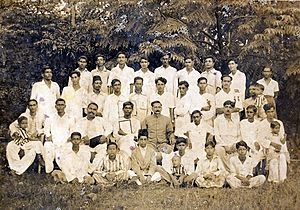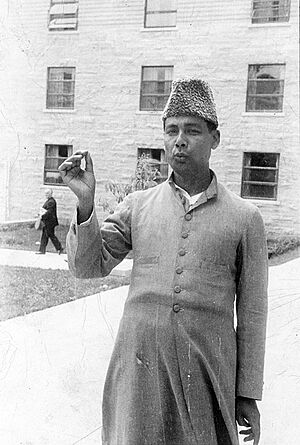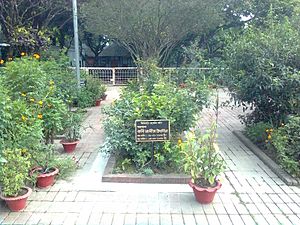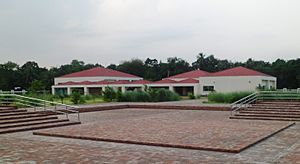Jasimuddin facts for kids
Quick facts for kids
Jasimuddin
|
|
|---|---|
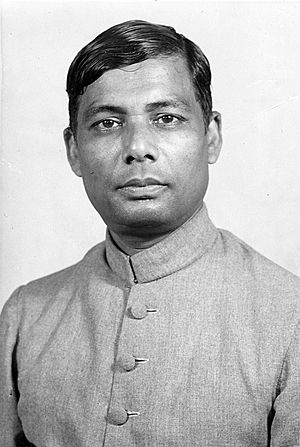
Jasimuddin in 1951
|
|
| Native name |
জসীমউদ্দীন
|
| Born | 1 January 1903 Tambulkhana, Faridpur, Bengal Presidency, British India |
| Died | 13 March 1976 (aged 73) Dhaka, Bangladesh |
| Occupation | Poet, songwriter, writer, radio, composer, personality, teacher |
| Nationality | Bangladeshi Pakistani (Prior to 1971) British Indian (Prior 1947) |
| Education | MA (Bengali) |
| Alma mater | University of Calcutta |
| Notable awards |
|
| Children | Hasna Jasimuddin Moudud |
Jasimuddin (Bengali: জসীম উদ্দীন) (born January 1, 1903 – died March 13, 1976) was a famous poet, songwriter, and writer from Bangladesh. People often called him Palli Kabi, which means "Pastoral Poet." This is because he wrote beautiful poems about village life and nature.
His most famous poems, Nakshi Kanthar Math and Sojan Badiar Ghat, are considered some of the best lyrical poems in the Bengali language. Jasimuddin helped bring back a style of writing called pastoral literature in Bengal during the 20th century. He was a very talented writer who created poems, songs, plays, novels, stories, and travel diaries.
Jasimuddin was born in Faridpur. He studied at Calcutta University, where he also worked as a research assistant. Later, he taught at the University of Dhaka for five years. In 1944, he started working for the government's Department of Information and Broadcasting until he retired in 1962.
He was a strong supporter of fairness for everyone and the Bengali language movement. He was also a leader in cultural movements during the 1950s and 1960s. He received several important awards, including the President's Award for Pride of Performance in 1958 and the Ekushey Padak in 1976. After he passed away, he was also given the Swadhinata Dibas Puruskar in 1978. He even turned down the Bangla Academy Award in 1974.
In 2018, the Bangla Academy created the Jasimuddin Literary Award. This award is given every two years to someone who has made a great contribution to Bengali literature.
Contents
Early Life and Education
Jasimuddin was born on January 1, 1903, in a village called Tambulkhana in Faridpur District. He was born at his maternal uncle's house. His father, Ansaruddin Mollah, was a school teacher. His mother was Amina Khatun.
He finished school from Faridpur Zilla School in 1921. He then went to Rajendra College and later earned his Bachelor of Arts (BA) degree in Bengali from the University of Calcutta in 1929. He completed his Master of Arts (MA) degree in 1931.
From 1931 to 1937, Jasimuddin worked with a scholar named Dinesh Chandra Sen. He helped collect folk literature, which includes old stories and songs passed down through generations. Jasimuddin helped put together a collection called Purbo-Bongo Gitika (Ballads of East Bengal). He collected more than 10,000 folk songs! Some of these songs are in his own collections, Jari Gaan and Murshida Gaan. He also wrote a lot about the meaning and ideas behind Bengali folklore.
In 1938, Jasimuddin became a lecturer at the University of Dhaka. He left the university in 1944 and then worked for the Department of Information and Broadcasting. He retired in 1962 as a deputy director.
His Poetry and Style
Jasimuddin started writing poems when he was very young. While he was still a college student, he wrote a famous poem called Kabar (The Grave). This poem used simple language to talk about family, faith, and sadness. It was even included in the Bengali textbook for university entrance exams while he was still a student at Calcutta University.
Jasimuddin is well-known for how he described village life and nature. He wrote from the perspective of people living in rural areas. This is why he earned the title of Palli Kabi, the "rural poet." His poems often used the style and themes found in Bengali folklore. His works Nakshi Kanthar Math (Field of the Embroidered Quilt) and Sojon Badiyar Ghat (Gypsy Wharf) are considered his masterpieces. They have been translated into many different languages.
Important Awards and Honors
Jasimuddin received many important awards for his contributions to literature:
- President's Award for Pride of Performance, Pakistan (1958)
- DLitt. (an honorary degree) by Rabindra Bharati University, India (1969)
- Ekushey Padak (1976)
- Independence Day Award (1978)
Personal Life
Jasimuddin was married to Begum Mamtaz Jasimuddin, who passed away in 2006. They had three sons: Kamal Anwar Hashu, Firoz Anwar, and Khurshid Anwar. They also had two daughters: Begum Hasna Moudud and Asma Elahi. Hasna is married to politician Maudud Ahmed. Asma is married to Tawfiq-e-Elahi Chowdhury.
Death and Legacy
Jasimuddin passed away on March 13, 1976. He was buried near his family home in Gobindapur, Faridpur. Every year in January, a festival called Jasim Mela is held in Gobindapur to celebrate his birthday and remember his life and works.
Major Works
Jasimuddin wrote many different types of works. Here are some of his most famous ones:
- Poetry
- Rakhali (1927)
- Nakshi Kanthar Maath (1929)
- Baluchor (1930)
- Dhankhet(1933)
- Sojan Badiyar Ghat (1933)
- Hashu (1938)
- Rupobati (1946)
- Matir Kanna (1951)
- Sakina (1959)
- Suchayani (1961)
- Bhayabaha Sei Dingulite (1972)
- Ma je Jononi Kande(1963)
- Holud Boroni (1966)
- Jole Lekhon (1969)
- Padma Nadir Deshe (1969)
- Beder Meye (1951)
- Kafoner Michil (1978)
- Maharom"
- Dumokho Chand Pahari (1987)
- Drama
- Padmapar (1950)
- Beder Meye (1951)
- Modhumala (1951)
- Pallibodhu (1956)
- Gramer Maya (1959)
- Ogo Pushpodhonu (1968)
- Asman Shingho (1968)
- Novel
- Boba Kahini (1964)
- Memoirs (Stories from his life)
- Jader Dekhachi (1951)
- Thakur Barir Anginay (1961)
- Jibonkotha (1964)
- Smritipot (1964)
- Smaraner Sarani Bahi (1978)
- Travelogues (Travel stories)
- Chole Musafir (1952)
- Holde Porir Deshe (1967)
- Je Deshe Manush Boro (1968)
- Germanir Shahare Bandare (1975)
- Music Books
- Rangila Nayer Majhi (1935)
- Padmapar (1950)
- Gangerpar (1964)
- Jari Gan (1968)
- Murshidi Gan (1977)
- Rakhali Gan
- Baul
- Other Works
- Dalim Kumar (1986)
- Bangalir Hasir Galpa Part 1 (1960) and part 2 (1964)
- Popular Song Titles
- "Kajol vromora re"
- Amar sonar moyna pakhi
- Amar golar har khule ne
- Amar har kala korlam re
- Amay bhashaili re
- Amay eto raate
- Kemon tomar mata pita
- Nodir kul nai kinar nai
- O bondhu rongila
- Rangila nayer majhi
- Nishte Jaio Phul bane, O Bhomora
- O bajan Chal jai mathe langol baite
- Prano shokhi re oi shone kodombo tole
- O amar dorodi age janle
- Bashari Amar Harai Giache
- Balu Charer Meya
- Badol Bashi Ore Bandhu
- Ganger Kulre Gelo Bhangia
- O Tui Jare Aghat Hanlire Mone
- O Amar Gahin Ganer Naya
- Amar Bandhu Binodia
Images for kids
 | Janet Taylor Pickett |
 | Synthia Saint James |
 | Howardena Pindell |
 | Faith Ringgold |


